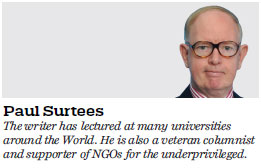Boosting expenditure on education a wise investment
Updated: 2017-08-04 06:10
(HK Edition)
|
|||||||
It is a very welcome, if long-expected, move by Hong Kong's new administration to inject an additional HK$5 billion in recurrent expenditure into education. Such a huge sum can certainly fund many improvements and comes on top of the already-hefty education budget. Chief Executive Carrie Lam Cheng Yuet-ngor rightly points out that enhancing education means we improve the knowledge and skills of the coming generations of Hong Kong people, leading to a better future. Who could possibly doubt that this is a very worthwhile objective?
The coming HK$30,000 annual subsidy to support local tertiary students who undertake self-funded courses is welcome. The proposals also include offering HK$5,000 a year to Hong Kong citizens attending universities on the Chinese mainland. Perhaps it would be fairer to set the level of subsidy for them at HK$30,000 a year, too? Many thousands of university students - and their supporting parents - would much appreciate these new benefits, which may also encourage youngsters from poorer families to continue longer in full-time education.
While the raft of educational improvement measures proposed do indeed represent concrete improvements in many areas, let us still be mindful of some aspects of education that remain a cause for deep concern.

In this wealthy city, government schools have needlessly very large class sizes - that would more commonly be expected to be seen in poor developing countries; there are simply too many pupils in each class. This limits the attention given to each child by the teacher and thereby potentially hinders students' full development, sometimes preventing them from reaching full potential. The proposals do address this need, with the recruitment of several thousand additional teachers - of information technology (1,000), for special education (840) and regular teachers (2,350). However, to greatly reduce class sizes across the board - as is clearly required - will need even more than that.
At university level, too, tutorial sizes are often too large, with the same effect as in our schools. Money would be needed to reduce class sizes by half, much of it for the recruitment of many more lecturers. University students' experience is enhanced if they do not commute to college from the family home but instead (likely for the first time) dwell away, in university-provided accommodation. This would require funding for building more university hostels. Campus living will, of itself, help encourage more participation in student social and sporting societies, adding to all-round development of the youngsters.
The future workforce of Hong Kong will need people who can think for themselves, collaborate with others and generally be more versatile in their academic and social life, and later in the workplace. It is well-noted that many of our smartphone-addicted generation are rather challenged in their interpersonal skills. This can be remedied by offering them more campus activities that help broader interaction. The long-established general approach at the school level of continuous drilling for specific public exams does not do enough to develop critical review skills or independent thinking. That approach needs to undergo a sea change, toward more task-based learning which can be achieved with more campus-based activities.
Too few Hong Kong youngsters have acquired the habit of reading books by the time they end their full-time education, and that sad fact even includes university graduates. Wide reading can help young people expand their imagination and contribute also to more general intellectual development, both during full-time education and well beyond. That needs to change and the Education Bureau has been rightly tasked with devising new methods to build up our youngsters' reading habits.
Providing better job security to younger school teachers is also planned, and is a move in the right direction. A funded short-term work-placement scheme, giving younger school teachers commercial work experience, would help to expand their horizons, and through it, the horizons of their students too.
Almost every Hong Kong youngster is besotted with near-constant smartphone use. Gathering information that easy way may be beneficial but many other uses of these portable electronic devices may fairly be regarded as a complete waste of time. The near-total distraction from paying attention to anything else - such as walking safely - that they provide may be mildly entertaining to the user but his or her brain may become benumbed by constant recourse to flickering images and texts on the little screen. Finding a way to encourage coming generations to limit their smartphone use (and instead to actively participate in real social, sporting and cultural activities) represents a major challenge to all educationalists here in Hong Kong, and indeed around the world.
So, while deployment of additional billions to fund these planned educational enhancement measures is welcome indeed, still more could be done to put Hong Kong's coming generations on the right track.
(HK Edition 08/04/2017 page10)